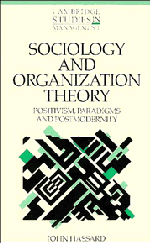Book contents
- Frontmatter
- Contents
- List of figures and tables
- Acknowledgements
- Introduction
- 1 Foundations of orthodoxy
- 2 The hegemony of systems
- 3 From functionalism to fragmentation
- 4 Closed paradigms and analytical openings
- 5 Multiple paradigm research
- 6 Postmodernism and organization
- Notes
- Bibliography
- Author index
- Subject index
- Cambridge Studies in Management
4 - Closed paradigms and analytical openings
Published online by Cambridge University Press: 03 May 2011
- Frontmatter
- Contents
- List of figures and tables
- Acknowledgements
- Introduction
- 1 Foundations of orthodoxy
- 2 The hegemony of systems
- 3 From functionalism to fragmentation
- 4 Closed paradigms and analytical openings
- 5 Multiple paradigm research
- 6 Postmodernism and organization
- Notes
- Bibliography
- Author index
- Subject index
- Cambridge Studies in Management
Summary
The critics from Silverman (1970) to Burrell and Morgan (1979) have used as a cornerstone of their critique the concept of incommensurable paradigms in organization theory.
(Donaldson 1988, p. 31)Introduction
In the last chapter we noted how the literature of organization theory has been replete with assessments of its paradigmatic status. We have seen numerous works analysing the study of organizations by reference to alternatives to the dominant ‘functionalist’ paradigm. The identification of new paradigm candidates has for many signalled a state of crisis, the orthodoxy being undermined by ‘critics’ who claim to solve problems which proponents of a generic systems approach are incapable of solving, mainly concerning change and conflict. These developments, in what may be termed the ‘sociology of organization theory’, have been predicated on Thomas Kuhn's history of science, with elements from The Structure of Scientific Revolutions thesis being used to justify descriptions of community structure. Kuhn's seminal concept of ‘paradigm’ has been the medium for depicting the development progress of organizational theory as ‘poly-paradigmatic’ (Lammers 1974).
However, despite the wealth of material generated by this process, the philosophy on which this style of analysis is based, ‘conventionalism’ (see Kuhn 1962, Hanson 1958, Feyerabend 1970a), has all too frequently been used in a superficial way.
- Type
- Chapter
- Information
- Sociology and Organization TheoryPositivism, Paradigms and Postmodernity, pp. 76 - 87Publisher: Cambridge University PressPrint publication year: 1993

